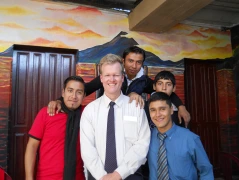Decades of research have only confirmed that kids suffer when they lose a biological parent, whether it be through divorce, death, adoption, abandonment or third-party reproduction.

“Losing a parent is physically, mentally, and emotionally detrimental for kids,” says Katy Faust in her book Them Before Us. “Sociologists overwhelmingly agree outcomes for children are best when the children are raised by their married mother and father, a consensus backed by decades of research on marriage and family.”
This was well-established science until the Dawn of the Enlightened Era of Marriage Equality. People’s hearts melted with compassion as they listened to the stories of same-sex parents wishing for a child.
All of a sudden, a barrage of studies emerged reputedly demonstrating that kids raised by same-sex parents came out just as well as parents raised by their biological parents, a mother and a father. The only thing that matters, we were told, was the stability of two loving parents.

And just like that, decades of research was suddenly upended overnight.
Because the media hype went into full swing and social scientists pushed the story it was a slogan that caught on quickly and was adopted widely. Even the Supreme Court was swayed by the “science.”
There was only one problem: While we heeded the tearful stories of same-sex parents who wanted to have children, we ignored the tearful stories of children who wanted a dad and mom.
“The pain in my life did not stem from the state not recognizing the relationship between my two moms,” wrote Heather Barwick in a Supreme Court amicus brief. “It stemmed from the turmoil of desperately wanting a father. I love my mom deeply, fiercely, and unconditionally. She is an incredible woman, but I also love my absent father. I ached for a father I knew I would never have.”
Actually, there was another problem. The “science” supporting same-sex parenting was baked. Methodology was flawed: participants were NOT selected randomly, sample sizes were small and NOT representative, reporting methods (such as same-sex parents answering on behalf of their children) were NOT reliable, according to an evaluation by the Heritage Foundation in 2015.
When Mark Regenerus conducted a legit study in 2012 – not perfect, but better than anything conducted previously – he demonstrated what family research has basically pointed out all along: parental loss hurts kids over the long run, even under the new rubric of same-sex parenting.
The equal sign was a cute logo. But the math was not equal.
“On 25 out of 40 outcomes evaluated, there were statistically significant differences between children from intact biological families and those of mothers in lesbian relationships in many areas that are unambiguously suboptimal, such as receiving welfare, need for therapy, infidelity, STIs, sexual victimization, educational attainment, safety of the family of origin, depression, attachments and dependencies, marijuana use, frequency of smoking, and criminal behavior,” the study says.
His conclusions detonated an atomic bomb of politcal fury.
An army of 200 social scientists arose and trumpeted in a signed complaint that Regnerus had doctored his conclusions based on his religious ideology. Leading the charge was UCLA’s demographer Gary Cates. If he accused Regnerus of being a religious ideologue, there were three fingers pointing back at him. Cates is gay.
Regnerus almost got fired from his job as Associate Professor at the University of Texas at Austin.
The message was ominous: anyone who dared to break ranks with the current political ideology would be canceled.
As social scientists dug through his study to unearth defects, Regnerus responded in a twofold manner: 1) no study supporting same-sex parenting had been subjected to similar scrutiny, and 2) keep doing studies (but legit ones).
Regnerus weathered the maelstrom.
Two things happened since his 2012 watershed study. More social scientists worked unafraid of the woke mob. And kids started posting the cries of their heart online. They still had a longing for the biological parent that was not present.
Culling from 12,000 participants in the National Longitudinal Study of Adolescent Health, Paul Sullins found and studied 20 randomly selected children growing up in same-sex parent household. They were twice as likely to suffer depression later as adults, along with suicidal thoughts and obesity when compared to peers raised by biological parents.
“These results align with what social science has already established about child development, namely the three essential staples of a child’s socio-emotional diet: mother’s love, father’s love, and stability,” Faust writes. Read the rest: Do same-sex parents do as well as biological parents?


